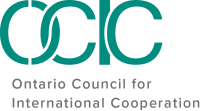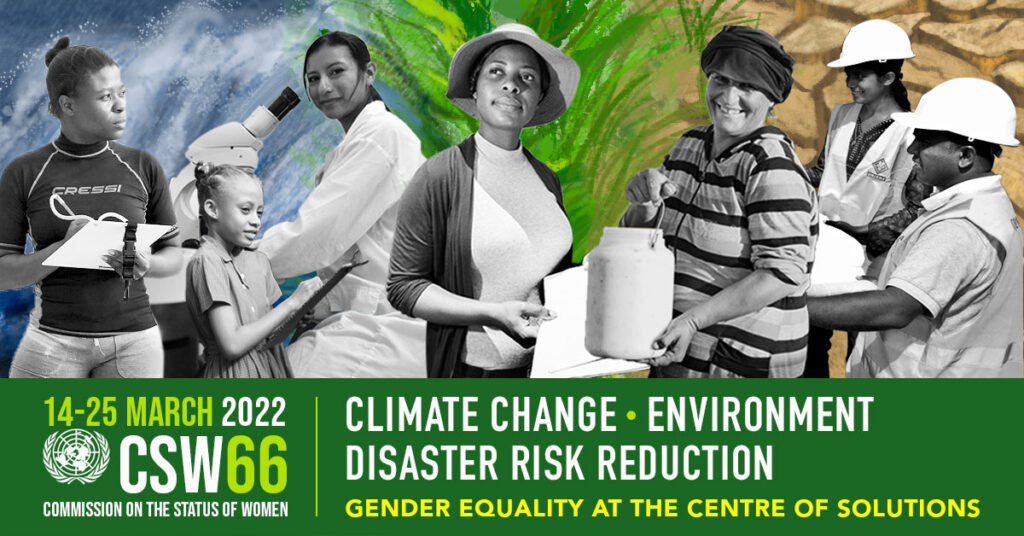
A LOOK INTO THE EXPERIENCES OF OCIC’S DELEGATION TO THE 66TH SESSION OF COMMISSION ON THE STATUS OF WOMEN (CSW)
By Harshini Ramesh, Shatabdy Zahid, Ray Veary, Farrah Seucharan | July 19, 2022
In March 2022 a group of youth and civil society organization delegates attended the 66th session of the United Nations Commission on the Status of Women (CSW), as a part of the Ontario Council for International Cooperation (OCIC) inaugural cohort. Through our collective experiences we learned from experts and delegates from around the world, while getting a peek into the international policy-making process. As first time delegates, the process was mystified up until we first started attending sessions through the two weeks. In this reflection we share not just our experiences but lessons to demystify the experience of a virtual United Nations delegation, in hopes that it encourages and aids future delegates in their experience.
What did we learn?
1. Building connections and community is vital to being plugged in and engaged.
Many of us found networking with other Canadian and international delegates enriching. There may be overlapping goals that you can work on together. Reaching out to key partner organizations like the United Nations Association and the official delegation can kick start the process of being in the loop for other events or informal fora to connect within. If you have a key issue area or recommendation set, start socializing your ideas early on by connecting with those headed to CSW. Keep a list of the names of speakers and attendees you connected with so that you can network with them later on LinkedIn and other platforms.
2. The process is opaque but there are still ways to learn about it.
Negotiations take place during the two weeks of CSW. Many of them happen behind closed doors and with a select group of people. Delegations from countries and organizations will spend a whole year preparing to influence these processes. For many youth and CSOs these are not rooms that are readily accessible for us to influence the negotiations. That being said, there are avenues, both formal and informal, to learning about what goes on. For example, youth delegates this year openly shared their experiences on group chats and in informal meeting spaces. Besides negotiations, there were also challenges with navigating the online platforms and interface, which may not be accessible for those with different language needs, disability friendly or be particularly intuitive. Identifying key supports like NGO CSW/NY or requesting that the organization on whose behalf you are going as a delegate to provide resources to better understand the process, will equip you to be successful at CSW.
Organizations or initiatives supporting delegates should consider creating the following tools to support their delegates:
- A tip sheet on how to make the most of a virtual delegation and how to navigate the platforms.
- A forum for regular communication for fellow delegates to share ideas and communicate throughout the conference (e.g. Slack).
- Workshops or other support on how to organize a delegation and organize within and beyond the delegation (for example, within community, professional, social networks).
3. Setting learning goals and realistic expectations will help you get the most out of the experience.
The days are packed with sessions. Going in with a focused approach of what you would like to learn or who you would like to interact with will help you plan out and sustain your engagement.
Some things we found useful to pursue include:
- Keeping a list of sessions and creating calendar slots for the sessions you hope to attend.
- Taking notes of meetings/sessions and creating reflections after each day. Consider four points for reflections: one new thing you learned, one thing you knew about but expanded your knowledge on, the presentation you enjoyed the most, and a presentation or point you may even have disagreed with.
- Noting questions you have and reaching out to organizers after a session, in case you didn’t have a chance to ask it. Also note down people you want to network with.
4. Find ways to amplify and bring your own work to before, during and after the delegation process.
The whirlwind of the event can leave you energized and asking “What now?” Reflecting on your experience and the issues you care about can be a starting point for translating those learnings into action.
Some questions we’ve asked include:
- How can we focus on capacity building and home to support youth doing the work?
- How can we make it more cohesive so more voices are better reflected at next year’s negotiations?
- What are the holes in engagement and what could be done to ameliorate engagement?
- How are we taking learnings from the global stage back to the grassroots movements at home?
Some actions you can take include setting up future delegations to continue work or even ensuring your experiences are heard by the right ears. This can look like collaborating with other teams of delegates before approaching MPs or policy organizations about potential actions might help with this issue.
5. Take care of yourself and support other delegates.
The experience of participating in a delegation can be overwhelming. Make sure to reach out for help when trying to navigate platforms (including asking your organization for support!). Ask and offer feedback to presenters to create accommodations for those with diverse needs. Sometimes, racing between session to session can make the conference feel like there isn’t enough time to digest the information. Build in time to unwind, reflect and unpack your learnings with others.
These lessons are just a starting point. We hope you can take these and make waves at your next delegation. We are so grateful and thankful to the OCIC team who have co-created a space for us to share our work on a global platform and for providing us with the privilege of learning from others doing good work around the world.






